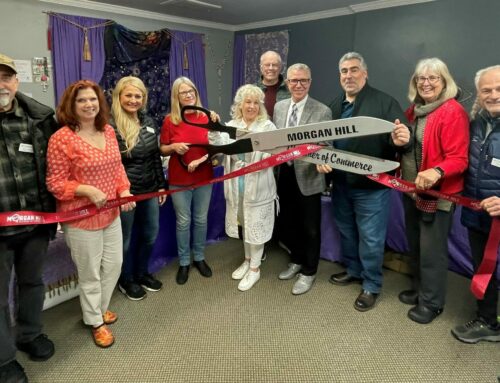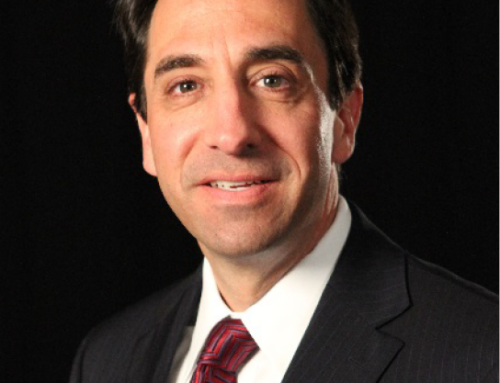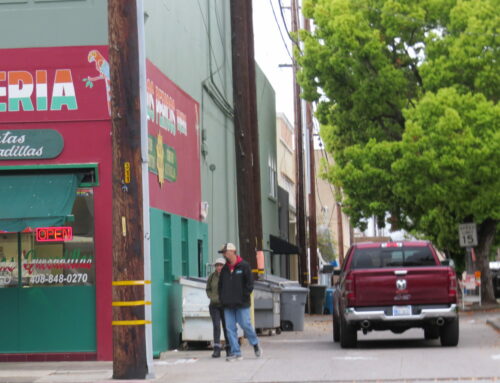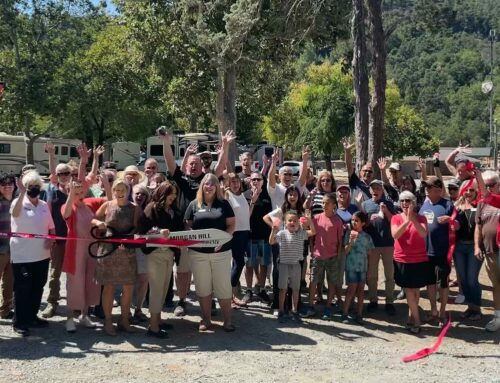88-year-old sits on the board of five nonprofits
Published in the February 4-17, 2015 issue of Morgan Hill Life
By Robert Airoldi

Photo by Robert Airoldi
Maria Skoczylas, 88, in her southwest Morgan Hill home. Skoczylas has been called ‘The Godmother of Sobrato’ transitional housing.
Last Christmas, Maria Skoczylas and a friend went to the homeless shelter in Gilroy to help people in need. While there, a lady with a 4-year-old girl and a 2-week-old baby came in for food prepared and donated by Westside Grill. Maria told the mother she’d take the girl to get some food. The little girl asked Maria if she knew how to hold a baby. Maria said she did. The little girl then told Maria, “When we get back maybe you could hold the baby, then my mom can get something to eat.”
“That’s the kind of thing that really, really moves me,” Maria said. “I’ll never forget that.”
And that encounter is just one of many the 88-year-old homeless advocate has had over the more than two decades she’s helped the homeless community.
Born and raised in Philadelphia, Maria was teaching in Germany and Italy in the early 1950s when she met her husband Rudy Skoczylas while visiting Spain. They married in 1958 and moved to California, living in Menlo Park, San Francisco and Sunnyvale before moving to Gilroy in 1965 when her husband established the bilingual program for the Gilroy School District. They adopted two children, a boy and a girl, now in their mid-50s. Throughout her teaching career she’s taught every grade, from kindergarten to high school.
After retiring in 1989 and after her husband passed away in 1996, the petite woman born to Italian parents who married a Polish man, moved to Morgan Hill and got even more involved helping the homeless.
She now sits on the board of directors for five nonprofits that aid the homeless and the disabled, and she’s most passionate about the homeless shelter at the Gilroy Armory and the Gilroy Compassion Center. It provides access to the services homeless people need to survive, become stable and lead self-sufficient lives.
Right now she’s focused on two things. The Gilroy Compassion Center is working to purchase a property that can house the organization and day center in the future, and which can also be used for a shelter. In addition, Santa Clara County is also making the modular buildings that once served as the courthouse in San Martin available, if they can be moved to new sites.
“I think of all the unfortunate people, the homeless are at the top of the list in terms of needing help,” she said. “They need to know someone cares about them.”
Her second passion is finding a new location for the Gilroy Compassion Center, because its lease expires at the end of the year.
“I don’t know what we’re going to do,” Maria said. “But something always happens, and I just know it will again.”
She worked, along with others, to establish the Sobrato Transitional Housing in Gilroy, which includes 60 apartments for formerly homeless, one third of those for battered women. A 140-bed shelter was planned for adjacent land but when the economy crashed, the project fell through. Now there are 25 apartments for disabled.
When the Sobrato Housing development opened it just happened to be her birthday, so her daughter threw her 80th birthday party that day at the facility. She registered her mother at Target for household items and raised $3,000. Jaime Rosso, owner of Rosso’s Furniture, generously doubled the donation and gave $6,000 worth of furniture and bedding to the new occupants, many of whom arrive with little or nothing, she said.
“There are so many generous people here,” she said. “All the churches have been very, very supportive and Don Gage has been very helpful.”
Although she reluctantly attends required meetings, her passion is getting personally involved in helping people, making phone calls, talking to people, to find shelter for those in need.
“No matter what you do, no matter how small, it’s meaningful to someone,” she said. “You don’t have to make it a big thing. You put all those little things together and it becomes massive.”






